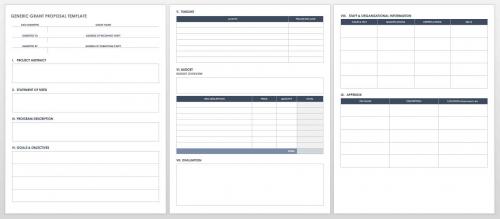
With grant proposals, individuals and organizations can solicit funds from foundations, government entities, corporations, and other sources for projects such as scientific research, humanitarian programs, academic study, social services, and professional development. Since grant funding can be a critical component for financing an organization or allowing research to progress, crafting an effective grant proposal is key. Whether you’re creating a lengthy proposal for a government agency, using a letter format for a private foundation, or entering info into an online application, a grant proposal helps potential funders understand the importance of your project and what you plan to achieve.
To help guide you through this process, a number of grant writing templates are available below, including proposal, application, and budget forms. These free, printable templates can provide structure, offer a professional presentation, and save you time and money. You’ll find templates in Microsoft Excel, Word, and PDF formats, all of which you can customize to suit your organization and project.

Use this template as a guide for preparing a grant proposal. It includes typical sections, such as a statement of need, project description, goals and objectives, and budget. There’s also room to add a detailed timeline. This template provides a basic outline that you can easily modify for a range of proposals.
Download Generic Grant Proposal Template

Many nonprofit organizations rely on grants to pay for operating expenses and provide community services. This grant proposal template for nonprofits includes sections for adding organizational background information, details about the community or population that will be served, measurable goals, and more. Remove or add sections as needed to create a customized template.
Download Nonprofit Grant Proposal Template
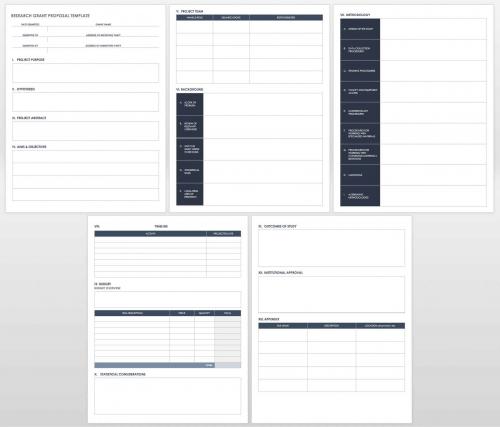
Present your hypothesis, literature review, research plans, and projected outcomes with this research grant proposal. This template could be adjusted to suit a scientific research proposal or academic grant application. Depending on the application requirements, you may be able to submit this document as a formal proposal, or you can use it to compile and organize all of the information that will go into your final proposal.
Download Research Grant Proposal Template

This technology grant proposal template is geared toward teachers and schools seeking funding for technology to use in the classroom. You can use the template to describe educational goals, technology needs, program sustainability, and budget requirements. The proposal also includes a timeline section to add a detailed schedule.
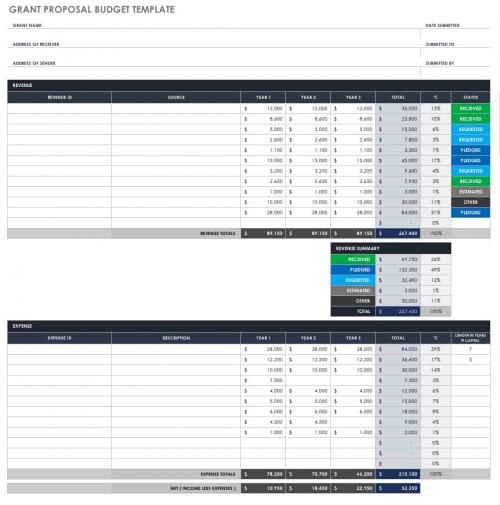
Create an itemized grant proposal budget that shows income and expenses over the course of a given time period. Enter funding sources and amounts along with specific costs, and the template will automatically calculate the totals. You can use this template for planning purposes, or submit it as part of a larger grant proposal.
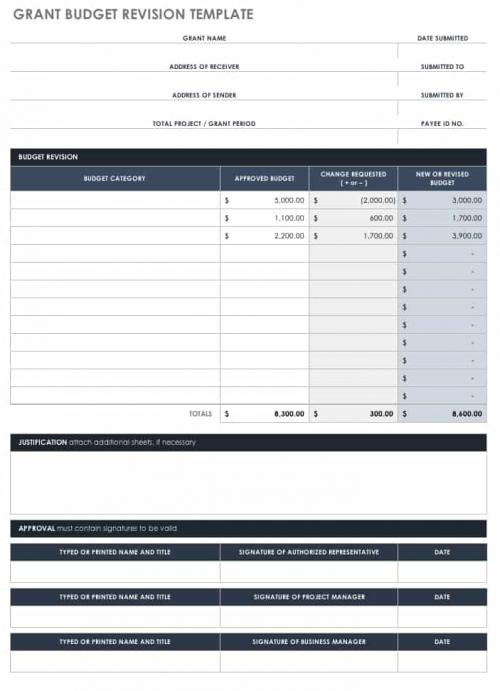
If you need to request a budget revision, this template is designed to show how funds will be adjusted by reducing the amounts allotted to one or more categories and increasing funds to others. Some grant makers require a revised budget so that they can approve how funds will be used. This template also includes room for adding organization and grant details.
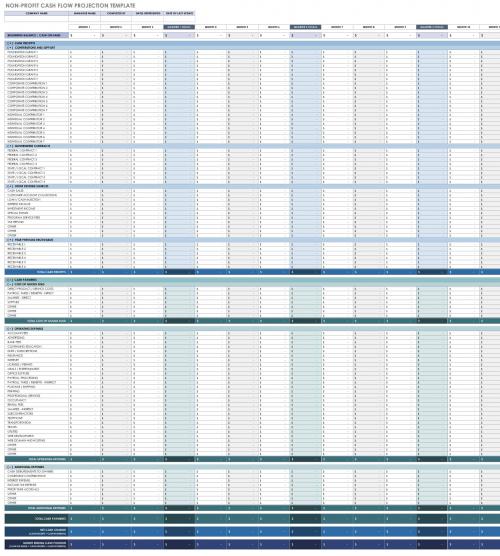
Nonprofits can use this cash flow template for financial planning over a 12-month period. The template shows revenue and expenses on a monthly, quarterly, and annual basis. The template also lists common funding sources along with operating costs, which can be edited to accommodate any type of organization.
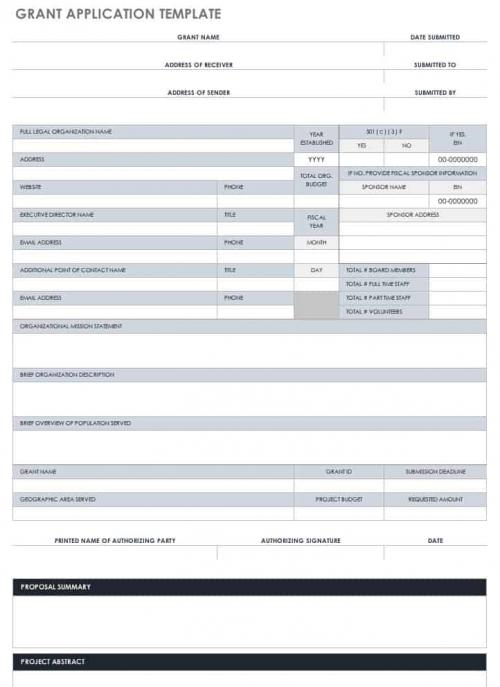
This template is intended for grant makers who want to create a grant application. It has sections for collecting applicant contact information, organizational details, and a thorough proposal, including a budget. Customize the application to cover whatever questions and information need to be reviewed to accurately assess a proposal.
Download Grant Application Template
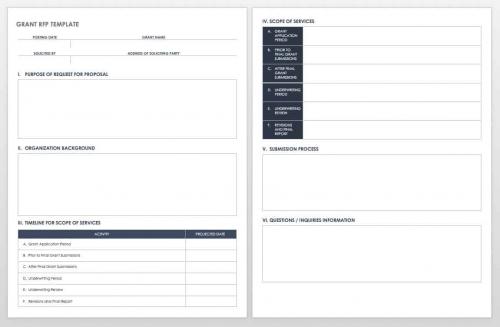
Grant makers can follow this outline to create a request for proposal template. Include submission instructions, agency background information, the timeline for reviewing proposals, and any requirements for proposal content and formatting. Applicants will also want to know what criteria will be used for evaluating proposals.

Once you have completed a proposal, use this checklist to ensure that all application requirements have been met and to evaluate the proposal’s quality and effectiveness. Consider soliciting feedback on your proposal from stakeholders or others who may be less familiar with the project and, therefore, more objective. Taking a moment to review a proposal may help reduce errors or omissions that could cost more time and money in the long run.
Download Grant Proposal Checklist and Evaluation Form
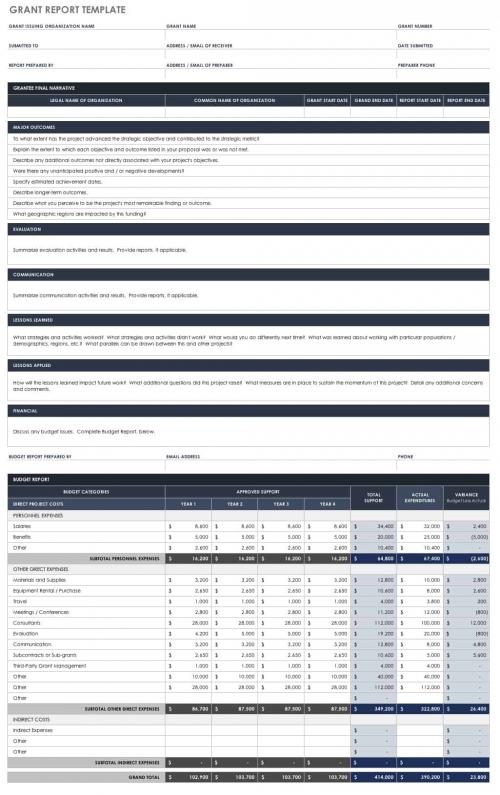
Grantees may be required to submit an interim or final report describing the progress and outcomes of a project. This simple template provides an outline for creating a comprehensive report, including a financial update that shows how funds have been spent. Grant makers can provide this form to grantees so they have a template to follow for creating a narrative report.
Grant writing varies across disciplines, and proposals range from lengthy reports to brief letters that summarize project details. A science grant proposal might be 50 pages long and include a thorough literature review, background information for key personnel, research methodology, and more. The National Science Foundation, for instance, has extensive guidelines for grant applications, and its policies and procedures are outlined in a comprehensive guide for grant applicants.
An application for a global grant from the Rotary Club, on the other hand, is much shorter, and the information required depends on the type of project to be funded. The scope of a project, the amount of funding being awarded, the type of grant maker, and other factors influence what is required from grant seekers.
Businesses are generally not eligible for grants unless they qualify for funding through local government initiatives or are involved in research and development projects that are relevant to federal programs. Some states offer small-business grants to woman- or minority-owned businesses as well as for certain industries. If your company qualifies for federal or state funding, creating a business grant proposal would entail following the guidelines for a specific grant.
Some organizations will accept a common grant application form, which allows for a standardized proposal that saves time for both grant makers and grant seekers. When researching grant opportunities, it is important to understand and follow the application requirements so that your efforts aren’t undermined by technical errors, missing information, or mistakes in the submission process.
Writing grants may seem to adhere to a series of linear steps, but unless you are applying for a one-time grant and will not use grant funding in the future, grant writing is a circular process that follows a funding cycle. The process begins with a goal or need that gets translated into a proposal, which is reviewed by the agency or foundation supplying the grant, and then accepted or rejected.
Whether the proposal is accepted or not, the grant writing process continues into the next funding cycle as you revise and resubmit earlier grants or apply for new ones. Nonprofit organizations, ongoing research studies, and other groups that rely on grants as a primary funding source may need to keep a calendar and dedicate a writer to planning and securing grants.
To write an effective proposal, it is helpful to not only find grant opportunities that are relevant to your project, but also understand the funding source and gear your proposal to that audience. If a funder is available to meet in person prior to your organization submitting a proposal, that can go a long way toward providing a more personal context to your project and developing an ongoing relationship. Above all, the proposal should describe a project that can realistically be carried out by the applicant based on experience, qualifications, and financial resources.
As stated earlier, grant proposals vary widely and the content is largely dictated by the application requirements of a particular funder. However, there are commonalities among grant proposals. Here is a look at some of the information typically included:
Before submitting a completed proposal, grant writers can do their own review to ensure that the proposal meets the necessary criteria and application requirements. Grant makers will in turn conduct their review process and select which proposals to fund. Once funding is awarded, the grant maker and the grantee sign an agreement that describes the terms of the grant.
There are many sample grant proposal templates online that provide examples of successful applications. For instance, the National Institutes of Health (NIH) offers a variety of sample proposals for scientific research, as well as small-business funding for research and development.
If you are new to grant writing, here are some tips to keep in mind as you develop your proposals:
One final tip: Create a reusable template that can be adjusted for a variety of grant applications.
Empower your people to go above and beyond with a flexible platform designed to match the needs of your team — and adapt as those needs change.
The Smartsheet platform makes it easy to plan, capture, manage, and report on work from anywhere, helping your team be more effective and get more done. Report on key metrics and get real-time visibility into work as it happens with roll-up reports, dashboards, and automated workflows built to keep your team connected and informed.
When teams have clarity into the work getting done, there’s no telling how much more they can accomplish in the same amount of time. Try Smartsheet for free, today.